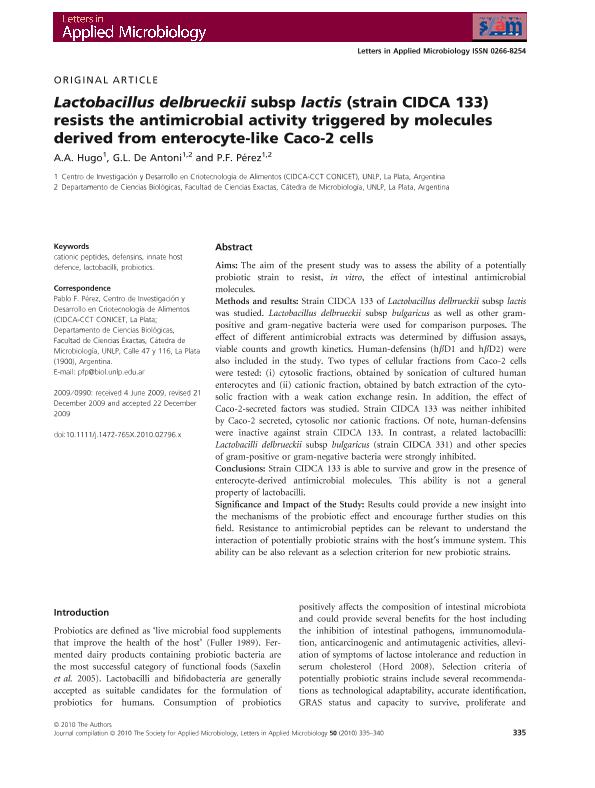Artículo
Lactobacillus delbrueckii subsp lactis (strain CIDCA 133) resists the antimicrobial activity triggered by molecules derived from enterocyte-like Caco-2 cells
Fecha de publicación:
04/2010
Editorial:
Wiley Blackwell Publishing, Inc
Revista:
Letters in Applied Microbiology
ISSN:
0266-8254
e-ISSN:
1472-765X
Idioma:
Inglés
Tipo de recurso:
Artículo publicado
Clasificación temática:
Resumen
Aims: The aim of the present study was to assess the ability of a potentially probiotic strain to resist, in vitro, the effect of intestinal antimicrobial molecules. Methods and results: Strain CIDCA 133 of Lactobacillus delbrueckii subsp lactis was studied. Lactobacillus delbrueckii subsp bulgaricus as well as other gram-positive and gram-negative bacteria were used for comparison purposes. The effect of different antimicrobial extracts was determined by diffusion assays, viable counts and growth kinetics. Human-defensins (hβD1 and hβD2) were also included in the study. Two types of cellular fractions from Caco-2 cells were tested: (i) cytosolic fractions, obtained by sonication of cultured human enterocytes and (ii) cationic fraction, obtained by batch extraction of the cytosolic fraction with a weak cation exchange resin. In addition, the effect of Caco-2-secreted factors was studied. Strain CIDCA 133 was neither inhibited by Caco-2 secreted, cytosolic nor cationic fractions. Of note, human-defensins were inactive against strain CIDCA 133. In contrast, a related lactobacilli: Lactobacilli delbrueckii subsp bulgaricus (strain CIDCA 331) and other species of gram-positive or gram-negative bacteria were strongly inhibited. Conclusions: Strain CIDCA 133 is able to survive and grow in the presence of enterocyte-derived antimicrobial molecules. This ability is not a general property of lactobacilli. Significance and Impact of the Study: Results could provide a new insight into the mechanisms of the probiotic effect and encourage further studies on this field. Resistance to antimicrobial peptides can be relevant to understand the interaction of potentially probiotic strains with the host′s immune system. This ability can be also relevant as a selection criterion for new probiotic strains.
Palabras clave:
CATIONIC PEPTIDES
,
DEFENSINS
,
INNATE HOST DEFENCE
,
LACTOBACILLI
,
PROBIOTICS
Archivos asociados
Licencia
Identificadores
Colecciones
Articulos(CIDCA)
Articulos de CENTRO DE INV EN CRIOTECNOLOGIA DE ALIMENTOS (I)
Articulos de CENTRO DE INV EN CRIOTECNOLOGIA DE ALIMENTOS (I)
Citación
Hugo, Ayelen Amelia; de Antoni, Graciela Liliana; Perez, Pablo Fernando; Lactobacillus delbrueckii subsp lactis (strain CIDCA 133) resists the antimicrobial activity triggered by molecules derived from enterocyte-like Caco-2 cells; Wiley Blackwell Publishing, Inc; Letters in Applied Microbiology; 50; 4; 4-2010; 335-340
Compartir
Altmétricas




